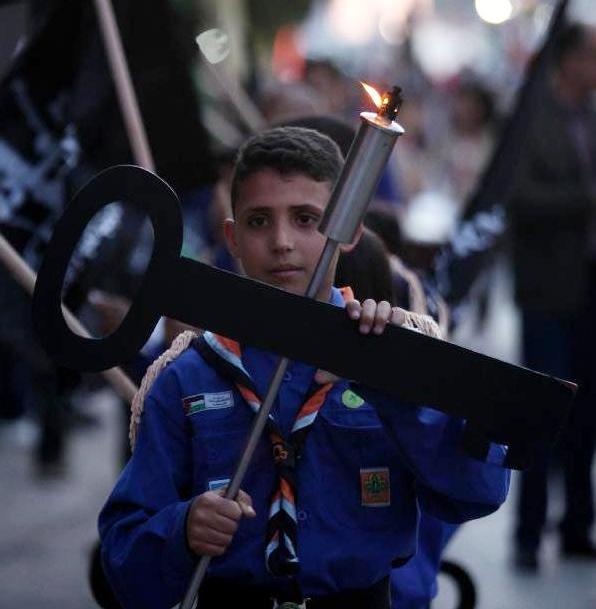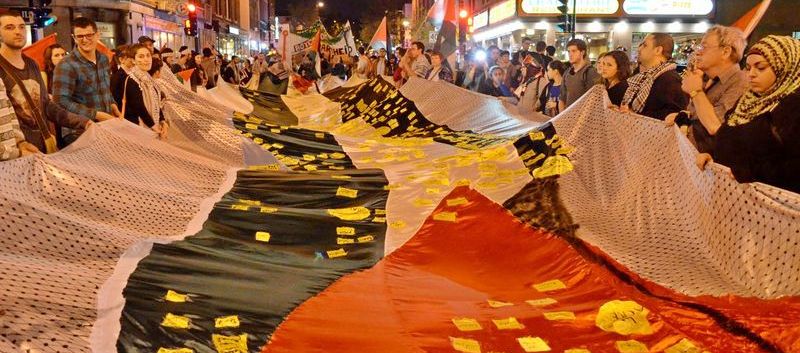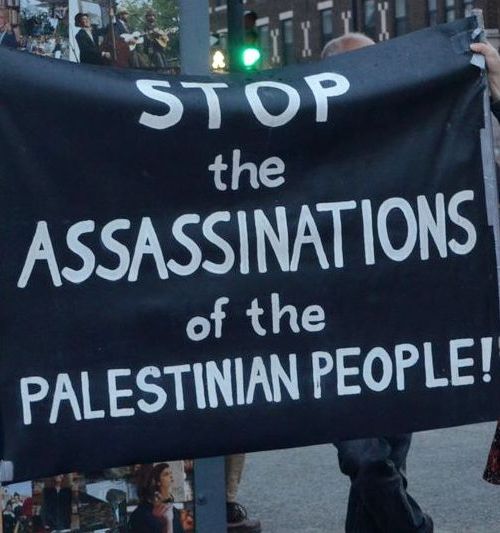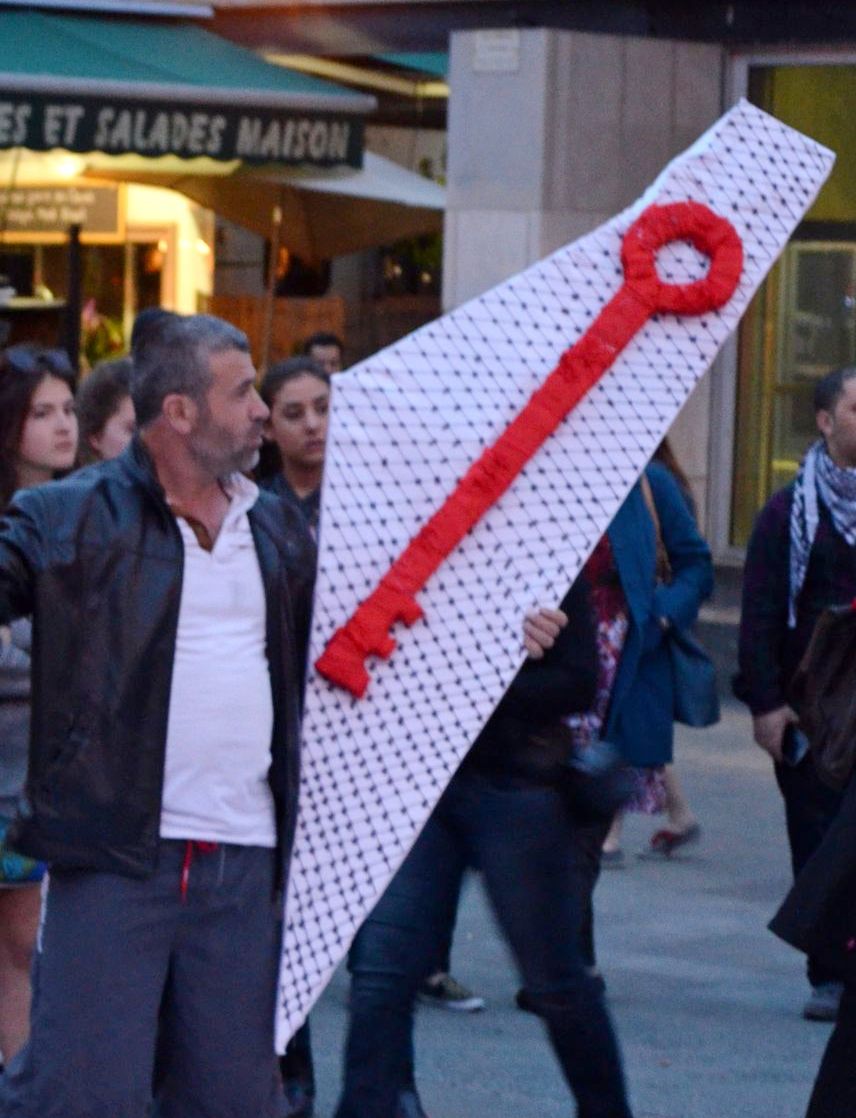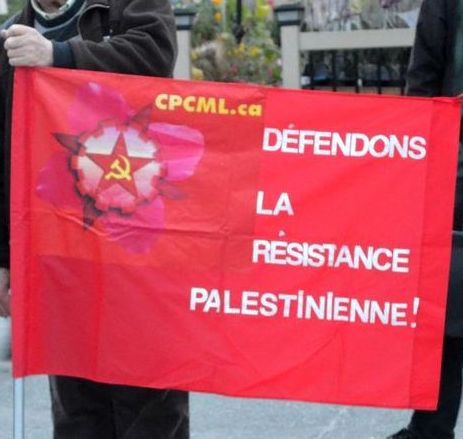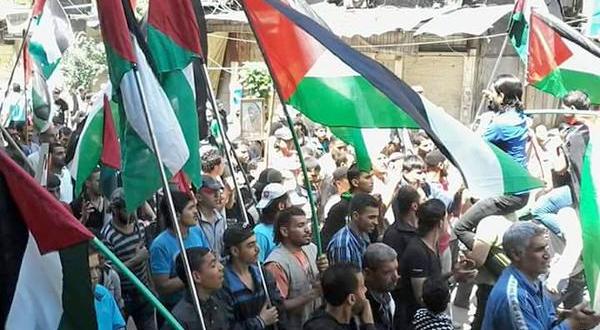
|
May
16,
2015
-
No.
20 Supplement 67th Anniversary of Al Nakba
67th
Anniversary of
Al Nakba
• The Ongoing Palestinian Nakba - Amjad Alqasis - • Palestinians Mark Nakba Day Amid Israeli Crackdown • The Ongoing Crime of Forcible Population Transfer and Secondary Displacement - Palestinian Human Rights Organizations Council - • Israel's Denial of the Nakba and Refugees' Right of Return - Badil - • Israeli Violations and Anti-Peace Stance - Dr. Riyad Mansour, Ambassador, Permanent Observer of the State of Palestine to the UN - The European Union and U.S. Ponder Their Priorities • A New EU Approach to Resolving the Israeli-Palestinian Conflict - European Eminent Persons Group - • We Are Prepared to Use All Elements of Our Power to Secure Our Interests in the Middle East - Interview, U.S. President Barack Obama - 67th Anniversary of Al Nakba The Ongoing Palestinian Nakba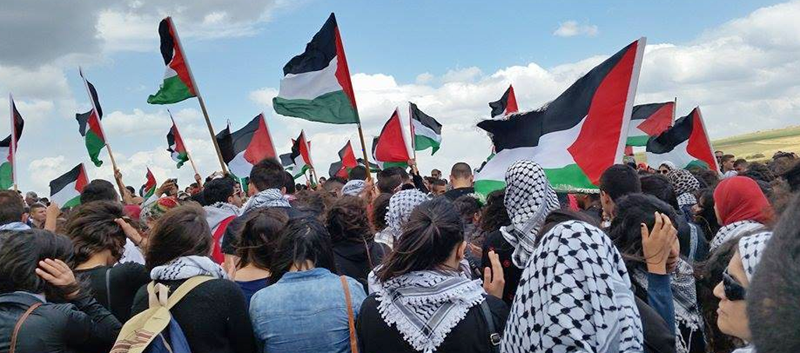 March of Return, April 23, 2015, to site of the destroyed village of Hadath. The year 2015 marks the 67th commemoration of the Palestinian Nakba. The Nakba encapsulates events which took place from 1947 to the early 1950s in which approximately 750,000 Palestinians became refugees. At the beginning of the 20th century, most Palestinians lived inside the borders of Palestine -- also known as 'historic' or 'Mandate Palestine' -- now divided into the state of Israel, and the occupied Palestinian territories: the West Bank, including East Jerusalem, and the Gaza Strip. Five major periods of forcible displacement transformed Palestinians into the largest and longest-standing unresolved refugee case in the world today. By the end of 2014, an estimated 7.7 million (66 percent) of the global Palestinian population of 11.5 million are forcibly displaced persons. A combination of Israeli state practices, laws, and policies seeks to achieve the displacement and dispossession of the indigenous Palestinian population, exerting complete control through a system of apartheid and occupation. This overall regime aims to colonize the territory of Palestine. Therefore, it is not limited to the Palestinians living in the occupied Palestinian territory (oPt), but also targets Palestinians residing on the Israeli side of the "1949 Armistice Line."
This system was originally applied during the
Palestinian Nakba in 1948
with a view to dominate and dispossess all forcibly displaced
Palestinians,
including the 150,000 who were able to remain within the "1949
Armistice
Line," later becoming Palestinian citizens of Israel. The UN resolution
from
1947 to partition Mandate Palestine triggered armed conflict between
local
Palestinians and Jewish colonists. This fostered an environment in
which the
Zionist movement could induce massive Palestinian displacement so as to
create the Jewish state. The task of establishing and maintaining a Jewish state on a predominantly non-Jewish territory has been carried out by forcibly displacing the non-Jewish majority population. Today, 66 percent of the Palestinian people worldwide (more than seven million) are themselves, or the descendants of, Palestinians who have been forcibly displaced by the Israeli regime. Israeli laws such as the 1954 Prevention of Infiltration Law and military orders 1649 and 1650 have prohibited Palestinians from legally returning to Israel or the occupied Palestinian territory. This deliberate and planned forcible displacement amounts to a policy and practice of forced transfer of the Palestinian population, or ethnic cleansing. This process started prior to 1948, and is still ongoing today in all parts of Mandate Palestine. Silent TransferThis process is carried out today by Israel in the form of the overall policy of 'silent' transfer, and not by the mass deportations witnessed in 1948 or 1967. This displacement is silent in the sense that Israel
carries it out while
trying to avoid international attention, displacing small numbers of
people on
a weekly basis. It is to be distinguished from the more overt transfer
achieved
under the veneer of warfare in 1948. For example, Israeli-administered
family
unification procedures are the only available avenue for Palestinians
who find
themselves separated from their families, and the current legislative
basis for
these procedures is provided by the Citizenship
and
Entry
into
Israel
Law
(Temporary Provision). 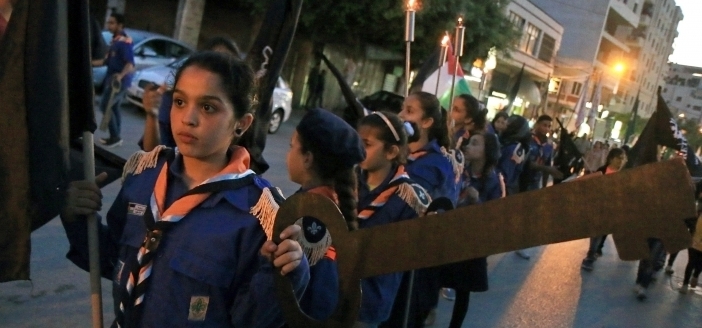 Scouts from the Balate refugee camp in Nablus, Palestine mark the Nakba, May 14, 2015.
This law -- passed by the Knesset (the Israeli parliament) in July 2003 and renewed annually up to the present day -- prevents Palestinians with West Bank or Gaza Strip IDs from gaining Israeli citizenship or permanent residency by way of marriage to a Palestinian citizen of Israel or Palestinian resident of Jerusalem. The law only allows for the granting of permits to reside or stay in Israel for purposes of medical treatment or fixed-term employment for a period which cannot cumulatively exceed six months.
Following the implementation of the law, human rights organizations petitioned the Israel High Court to have the legislation overturned. In rejecting this petition, Justice Asher Grunis commented that "human rights are not a prescription for national suicide." This reasoning is instructive, demonstrating that the driving force behind this ethnicity-focused policy is rooted not in security concerns, but in demographic sensitivities. Tragically, family unification has become yet another tool deployed by the State of Israel to protect the Jewish majority within its borders, with the result that thousands of Palestinians face a deeply troubled and uncertain future. A holistic consideration of Israel's approach to family unification -- both for Palestinians residing in Israel and those residing within the oPt reveals a clear and highly discriminatory pattern of behavior, underpinned by the motivation to reduce Palestinian presence within this territory. Indeed, review of the historical background and contemporary reality surrounding family unification paints a picture of ever-tightening restrictions on the ability of Palestinians to enjoy the most basic of human rights, that of a family life. This steady erosion of democratic principles has ultimately resulted in many thousands of Palestinians suffering great hardship and emotional distress which intrudes on all aspects of life. As such, Israel is turning family unification into a tool for forced population transfer which is not restricted to physical force, "but may include threat of force or coercion, such as that caused by fear of violence, duress, detention, psychological oppression or abuse of power against such person or persons or another person, or by taking advantage of a coercive environment," according to the International Criminal Court. Rights-Based ApproachThis Israeli system must be brought to an end and must be judged in accordance with international law and standards. A solution to the ongoing colonization and oppression of the Palestinian people should be found through a strict rights-based approach. Such rights are not guaranteed through political negotiations, but through full adherence to and implementation of international law and rights.
In this light, it should be unacceptable to refer to illegal Israeli settlements in the oPt as "undermining efforts towards peace" -- as is regularly the case in political circles -- whilst in reality these settlements constitute a violation of numerous international standards and principles. As such, they are but one of a growing number of physical manifestations of Israel's ongoing impunity. This represents an ugly and dangerous precedent, and if the future sanctity of international law and standard is to be protected, its implementation should not be subject to negotiations, but demanded from the outset. Therefore, Israel's continuous and calculated strangulation of the Palestinian people must be properly challenged by the international community, and this challenge must come from an assessment of Israeli actions and policy through the lens of international law. The facts on the ground demonstrate that such an assessment will reveal elements of an international crime against humanity, and Israel's regime must be judged accordingly, with the state's impunity for these crimes brought to an end. Yet, the silence -- if not complicity -- of powerful members of the international community in relation to these crimes continues. The resulting reality represents a worst case scenario: the intense and prolonged suffering of a colonized and occupied population, witnessed in conjunction with an emphatic politicization and devaluing of international law. Amjad Alqasis is a human rights lawyer, legal researcher and a member of the Legal Support Network of BADIL Resource Center for Palestinian Residency and Refugee Rights. Since August 2014, he is an adviser at Al Haq Center for Applied International Law. (Ma'an News, May 13, 2015. Photos: ActiveStills, Palestine Info Centre, Bea4Palestine) Palestinians Mark Nakba Day Amid Israeli Crackdown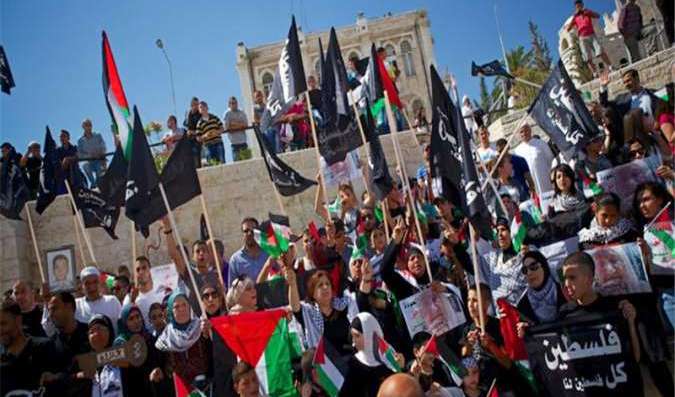 Ramallah rally commemorating 67th anniversary of Nakba, May 13, 2015. Activities to commemorate the Nakba have been underway for several days across Palestine, to highlight Israel's denial of the right of return to more than 7 million Palestinian refugees displaced in 1948 when Israel was founded.
This year's anniversary fell on a Friday, a religious holiday in Palestine when people do not work and schools are closed because they are attending Muslim prayers. Therefore, thousands of people took part in marches and protests on Wednesday, May 13 to mark the anniversary. Many mosques devoted their Friday sermons to raising awareness about the "right of return" for Palestinian refugees and their descendants to their former homes. Several rallies in Israel and the Palestinian territories took place after noontime Friday prayers. As part of Zionist attempts to criminalize commemoration
of the Nakba,
Israeli police were put on alert to counter any "violence" after Friday
prayers.
During last year's Nakba Day, two Palestinians were shot dead by
Israeli
Border Police near Ramallah, prompting an investigation and claims that
Israeli soldiers used live bullets against protesters. In 2011, Israel enacted the "Nakba Law, which authorizes Israel's finance minister to revoke funding from institutions that reject Israel as being a "Jewish state" or mark the country's Independence Day as a day of mourning. This law has made it increasingly difficult for the 1.7 million Palestinians who hold Israeli citizenship to commemorate the Nakba. "The Nakba Law is part of an atmosphere to suppress the
Nakba narrative
and a discussion of the Right of Return for Palestinian refugees," Liat
Rosenberg, Director of Zochrot, told Al Jazeera. "These are right-wing,
anti-democratic efforts [that] continue to create an atmosphere of fear
and
suppress this issue from the public discourse." Zochrot is an Israeli
non-governmental organization that promotes acknowledgement and
accountability for the ongoing injustices of the Nakba, and also
promotes the
Right of Return for Palestinian refugees. 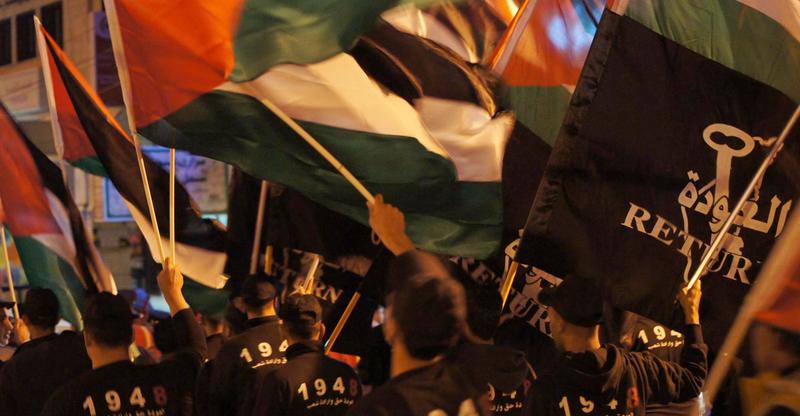 Torchlight march in Ramallah, May 14, 2015. Israel Sentences Former Fatah Official to Nine Months
Imprisonment
|
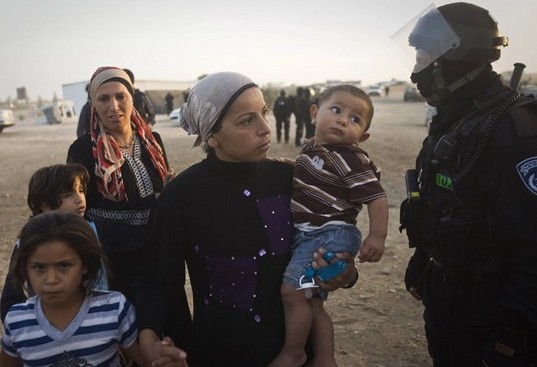 Family forcibly displaced by demolition of the town of Al-Araqib, July 2010. |
Inside occupied East Jerusalem and so-called 'Area C' (accounting for more than 60% of occupied West Bank land), Israel pursues a policy of forcible transfer of Palestinians by way of -- inter alia -- unlawful land appropriation, home demolitions, denial of residency, restrictions on land access, and extensive settlement expansion. This multitude of grievous rights abuses is conducted against a backdrop of discrimination, harassment and violence perpetrated by Israeli settlers and security services alike, and reflected in Israel's rapidly advancing plans to forcibly transfer Palestinian Bedouin communities on the Jerusalem periphery to urban townships in the Jordan Valley.
Yet this widespread Palestinian suffering is not limited to the borders of Mandate Palestine, but extends to the millions of individuals who make up the international Palestinian Diaspora. Of particular concern is the fate of those in Syria, with the United Nations Relief and Works Agency finding that half a million Palestinian refugees have been directly affected by the country's ongoing conflict. Many of these refugees will now have experienced secondary or tertiary displacement, whilst the level of human suffering for residents of Yarmouk Camp in Damascus has escalated wildly following extreme violence and the failure of the international community to ensure the delivery of desperately needed humanitarian aid and assistance.
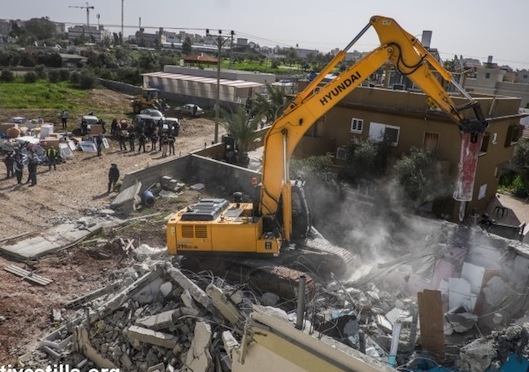 Home demolition in Lod, February 10, 2015. |
These abhorrent developments, along with the predictable failure of US-led 'peace talks' in 2014, highlight the necessity of providing a durable solution to Palestinian refugees which is based upon the just application of international law, rather than political bargaining. The continued failure to deliver to Palestinians the full protection to which they are entitled under international law -- centered around their inalienable right to return to their ancestral homes, unequivocally codified in UDHR Article 13, UNGA Resolution 194 and UNSC Resolution 237 -- must be addressed as a matter of extreme urgency. For as long as the current status quo is maintained, and international protection is absent, Palestinians remain condemned to a fate of continued acute hardship and suffering.
Avenues through which to pursue the just application of international law and, by extension, the promotion of durable, rights-based solutions, are already in place. Alongside diplomatic efforts at the international level to demand Israeli adherence to all applicable legal instruments, states and international civil society alike must also support and fully participate in mechanisms such as United Nations Independent Commissions of Inquiry, and the investigations of the International Criminal Court (ICC). The strength of these processes lies not just in their respective potential to promote accountability and deliver justice, but also in their contribution to a wider movement towards legally-rooted solutions for the Palestinian people.
Accordingly, we, the undersigned members of the Palestinian Human Rights Organizations Council, make the following recommendations:
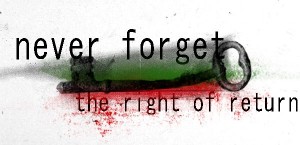 - That the international community genuinely
strives to
secure international
protection -- including durable solutions -- for Palestinian refugees,
and
primarily, their Right of Return and to self-determination.
- That the international community genuinely
strives to
secure international
protection -- including durable solutions -- for Palestinian refugees,
and
primarily, their Right of Return and to self-determination.
- That the international community takes all measures to ensure Israel's compliance with its obligations under International Humanitarian Law and International Human Rights Law and calls on Israel to cease those policies and practices which adversely affect the protected population. The international community is thus reminded that forcible transfer amounts to a grave breach of International Humanitarian Law, and as such, States must not recognize the ensuing situation as lawful, nor render aid or assistance in maintaining the situation. The International Community should further call for immediate cessation of such activities and seek guarantees of non-repetition and reparations.
- That the PLO makes concerted efforts to press concerned states and international agencies to meet their responsibilities, particularly with a view to fulfilling their obligations relating to non-refoulement, and non-discrimination.
- That the international community supports endeavors by international mechanisms aimed at securing justice and accountability, including the UN Commission of Inquiry and the ICC.
- That the international community significantly
strengthens efforts to
deliver humanitarian assistance and protection in accordance with
international
standards to Palestinian refugees and Internally Displaced Persons,
particularly to those
besieged in
Gaza and Syria.
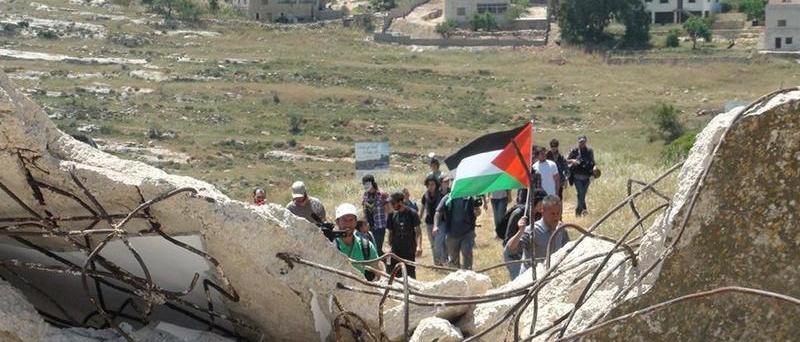
Palestinians return May 8, 2015 to house demolished in Nabi Saleh 10 days earlier.
(May 14, 2015. Photos: Active Stills, Palestine Social, Popular Struggle.)
Israel's Denial of the Nakba and Refugees'
Right of Return
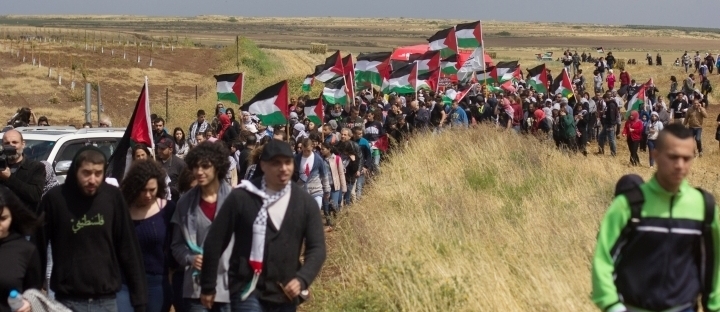
Palestinian marches of return are held to coincide with Israel's independence day.
This march returned to the site of Hadath village, April 23, 2015.
Israel commemorates its independence day with a series of events celebrating a Jewish 'homecoming' to the land and the birth of the Jewish state as achievements of the Zionist dream for 'Eretz Israel' (all of Mandate Palestine). As Israel celebrates, it entirely disavows any responsibility for the destruction of the homeland of the Palestinian people and their forced displacement -- what Palestinians call the 'Nakba' or 'Catastrophe.' Early Zionist leader Israel Zangwill spoke of "a people without land returning to a land without people."
This denial is also found in schools, on official maps and in law. It, in turn, helps perpetuate ongoing confiscation of Palestinian land, an existing discriminatory legal regime, and today's forced displacement. In the words of Eitan Bronstein of the Israeli Zochrot (Remembering) Association:
If the Nakba never happened, it is impossible that millions of Palestinians today are refugees who demand restitution of their rights.
Between the end of 1947 and early 1949, more than half of the Palestinian population living in Mandate Palestine (estimated at 1.3 million) was displaced by Zionist militia and the state of Israel.
After 1948, Israel used military regulations and legal statutes regarding 'absentee property' to ensure that Palestinian refugees and Internally Displaced Persons could not return to their property and claim it; those who remained on their land were also subject to discriminatory regulations and a military government that lasted until 1966.
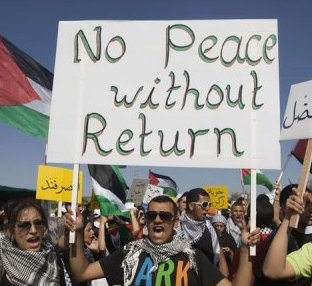 In 1950, Israel enacted the Law of Return,
granting any
Jew anywhere the
right to citizenship as a Jewish national in Israel and (since 1967)
also in the
occupied Palestinian territory (OPT) while the 1952 Citizenship Law
denationalised the Palestinian refugees. The establishment of a Jewish
extra-territorial ethno-religious nationality as the basis for
citizenship created
one set of rules for Jews and another for Palestinians. Since 1967,
Israel's
military government in the OPT has established a similar discriminatory
regime of military regulations.
In 1950, Israel enacted the Law of Return,
granting any
Jew anywhere the
right to citizenship as a Jewish national in Israel and (since 1967)
also in the
occupied Palestinian territory (OPT) while the 1952 Citizenship Law
denationalised the Palestinian refugees. The establishment of a Jewish
extra-territorial ethno-religious nationality as the basis for
citizenship created
one set of rules for Jews and another for Palestinians. Since 1967,
Israel's
military government in the OPT has established a similar discriminatory
regime of military regulations.
While Israel presents itself as a democracy, UN experts have frequently raised concern. In 2003, the Committee on Economic, Social and Cultural Rights concluded that Israel's extraterritorial concept of 'Jewish nationality' is grounds for "exclusive preferential treatment" resulting in "discriminatory treatment against non-Jews, in particular Palestinian refugees." In June 2007, the Committee for the Elimination of Racial Discrimination (CERD) concluded that "the denial of the rights of many Palestinians to return and possess their homes in Israel is discriminatory and perpetuates violations of human rights." CERD also applied the concept of apartheid to some of Israel's practices towards Palestinian citizens of Israel, requesting that Israel "assess the extent to which the maintenance of separate Arab and Jewish 'sectors' may amount to racial segregation."
Israel's apartheid-like policies are visible in the
Naqab (Negev), where
160,000 indigenous Bedouin live, many in unrecognized villages that
were not
included in Israel's national master plan. These 'unrecognized'
villages have
no access to public services (water, electricity, health or education)
and are
issued no construction licenses. Unlicensed buildings there are likely
to face
demolition.
Officials estimate that 45,000 houses in the Naqab could be demolished under Israeli law. At the same time, Israel initiated in 2005 a ten-year, US$3.6 billion plan to develop the Naqab and double the number of its Jewish residents.
Israel considers the OPT 'disputed' not 'occupied.' In January 2007, UN Special Rapporteur on Human Rights in the OPT, Prof. John Dugard, reported that Israel's 40-year-long occupation of the OPT "included elements of colonialism and apartheid." Miloon Kothari, UN Special Rapporteur on the Right to Adequate Housing, found that "the institutions, laws and practices that Israel had developed to dispossess the Palestinians (now Israeli citizens) inside its 1948 border (the Green Line) have been applied with comparable effect in the areas occupied since 1967" and that "Israel's confiscation of land and properties belonging privately and collectively to the Palestinians in the occupied Palestinian territories is a dominant feature of the occupation and an essential component of Israel's population transfer programme."
BADIL Resource Center for Palestinian Residency and Refugee Rights is an independent, community-based non-profit organization mandated to protect and promote the rights of Palestinian refugees and internally displaced persons.
Israeli Violations and Anti-Peace Stance
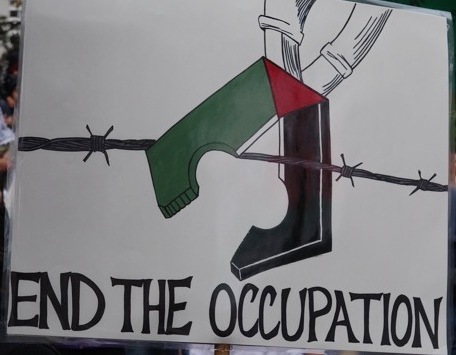
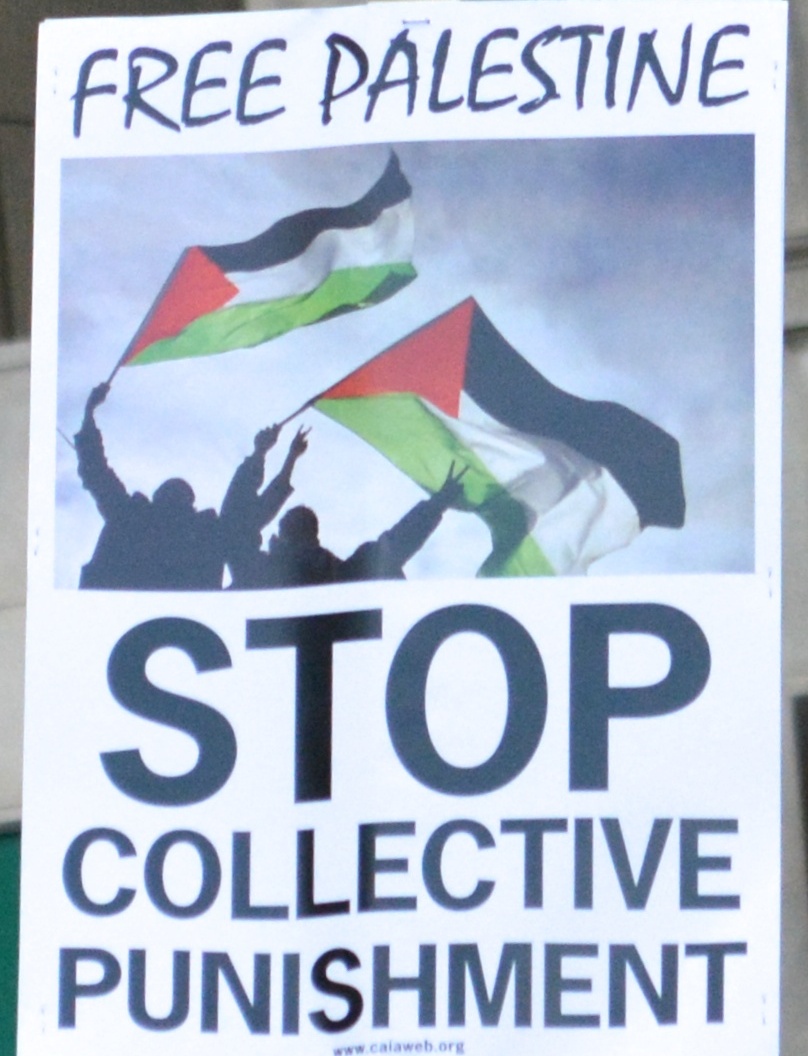
Posted below is a letter from Dr. Riyad Mansour,
Ambassador, Permanent Observer of the
State of Palestine to the United Nations, sent to UN Secretary General
Ban Ki-moon, as well as the President of the Security Council and
the President of the General Assembly on May 11.
***
Excellency,
In both word and deed, the new Israeli Government is proving its anti-peace, anti-two-State stance as it persists with unlawful policies and practices entrenching its illegitimate occupation and colonization of the State of Palestine, including East Jerusalem, and systematically and grossly violating the human rights of the Palestinian people.
From the composition of Prime Minister Netanyahu's Cabinet, including a Justice Minister who is on record as calling for violence and destruction against the Palestinian people and calling Palestinian children "little snakes"; to recent announcements to carry on with settlement activities in Occupied East Jerusalem and particularly in the so-called "E1 area"; to demolitions of Palestinian properties and seizure of Palestinian homes by settlers; to the forced displacement of hundreds more Palestinian civilians in the West Bank; to the ongoing inhumane and suffocating blockade against the Gaza Strip; to the arrest of more than 100 Palestinians, including children, in the span of just one week; to ongoing violent assaults on Palestinian civilians by the Israeli occupying forces and settlers -- it is clear that Israel, the occupying Power, is not interested in peace and intends to persist with its destructive and colonial occupation policies in grave breach of international law, flagrant violation of United Nations resolutions and absolute contempt of the international community.
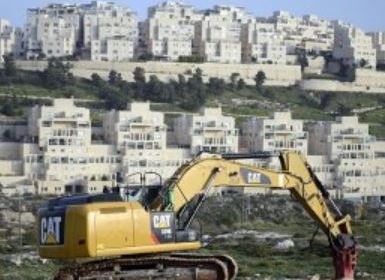 New units approved for construction in illegal settlement "Ramat Shlomo." |
On 7 May, shortly after the formation of the new Israeli Government, an announcement was made regarding the approval for construction of 900 more settlement units in the so-called "Ramat Shlomo" settlement in Occupied East Jerusalem. This approval of a previously-declared plan will facilitate the actual construction of hundreds more units to which hundreds more Israeli settlers will be transferred by the occupying Power in direct contravention of Article 49 of the Fourth Geneva Convention as well as other relevant provisions of international law, including the Rome Statute of the International Criminal Court. Such actions further undermine the contiguity of the Palestinian land and the viability of the two-State solution, making a mockery of international calls and efforts to salvage and actually implement that solution.
Clearly, this extremist government is bent on pursuing the aggressive, unlawful measures that have been Israeli policy for decades with the aim of pushing the Palestinian people off their land. In addition to settlement expansion, on 4 May, the occupying Power approved plans for the demolition of tents and homes in the village of Khirbet Susiya near Al-Khalil in order to advance plans to build a park for settlers in the area. If not stopped, such demolitions will render 450 Palestinians, including 120 children, homeless and forcibly displace them from their land, in breach of international law.
Palestinian civilians in the northern Jordan Valley also continue to be displaced as a result of so-called "military training exercises". Bedouin and herding communities have repeatedly borne the brunt of such practices. 320 Palestinians were recently temporarily forced to leave their homes and livestock due to these activities, which have in the past led to the destruction of Palestinian land and property in the area, including the burning of 3,000 dunums of crops after a fire caused by military drills on 28 April and the burning of 5,000 dunums of land on 4 May due to heavy military fire. Such Israeli practices are widely considered to be among the many means used to engender fear and uncertainty among Palestinians in the Jordan Valley area, increasing pressure on them to leave their land and thus facilitating further de facto annexation by the occupying Power.
Simultaneously, Israeli settlers continue their terror rampages and seizure of Palestinian properties in the Occupied Palestinian Territory. In the recent period, this has included assaults on Palestinian men, another hit and run incident in which a 5-year old Palestinian child was struck by a settler car, and the destruction of a water network affecting at least 40 homes in Al-Khalil. Also, on 6 May, in the Silwan neighborhood of Occupied East Jerusalem, a group of Israeli extremists, comprised of 20 settler youth and backed by occupying forces, overtook yet another Palestinian home, raiding and seizing the home while the Palestinian family that owns the home was away. Such settler depravity is undoubtedly fueled by the constant provocation and incitement by Israeli political leaders, including members of the new Israeli Government, and by the absolute impunity enjoyed by the settlers, who are never held accountable for their crimes against Palestinians.
This protection crisis persists also as a result of the excessive, indiscriminate force constantly used by the occupying forces against the Palestinian civilian population in breach of international humanitarian law. Military raids in which civilians are shot at are the daily norm in the West Bank, and civilians in the blockaded Gaza Strip, particularly near the border areas and at sea, also continue to be targeted by Israeli fire. Moreover, the occupying forces continue to fire at civilian demonstrators, including most recently during demonstrations marking World Press Freedom Day, during which at least 13 Palestinians, including 2 children and 5 journalists, were injured.
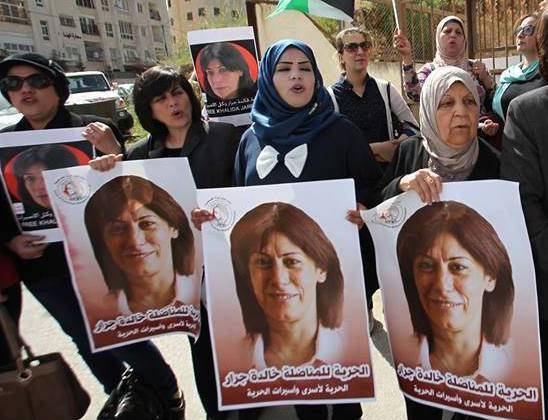 Moreover, Palestinian civilians
continue to be targeted
for arrest and
detention by the Israeli occupying forces, with an average of 100
persons a
week arrested, including children and women, in violation of the Geneva
Conventions. Their plight during incarceration is marked by unbearable
physical and psychological mistreatment and grave affronts to their
human
dignity. In this regard, I draw attention to the arrest of another
democratically-elected Palestinian official, Ms. Khalida Jarrar, a
parliamentarian in the Palestinian Legislative Council. Ms. Jarrar was
seized
from her home by occupying forces in Ramallah on 2 April and sentenced
to
a six-month administrative detention. She has clearly been targeted for
her
peaceful, non-violent, legitimate activities in rejection of the
occupation,
similar to so many Palestinian political prisoners. We call for her
immediate
release and the release of Palestinian prisoners and detainees so
wrongfully
being held captive by Israel.
Moreover, Palestinian civilians
continue to be targeted
for arrest and
detention by the Israeli occupying forces, with an average of 100
persons a
week arrested, including children and women, in violation of the Geneva
Conventions. Their plight during incarceration is marked by unbearable
physical and psychological mistreatment and grave affronts to their
human
dignity. In this regard, I draw attention to the arrest of another
democratically-elected Palestinian official, Ms. Khalida Jarrar, a
parliamentarian in the Palestinian Legislative Council. Ms. Jarrar was
seized
from her home by occupying forces in Ramallah on 2 April and sentenced
to
a six-month administrative detention. She has clearly been targeted for
her
peaceful, non-violent, legitimate activities in rejection of the
occupation,
similar to so many Palestinian political prisoners. We call for her
immediate
release and the release of Palestinian prisoners and detainees so
wrongfully
being held captive by Israel.
We reiterate the call on the international community to uphold its responsibilities, especially the Security Council, to put an end to Israel's settlement colonization, destructive measures and collective punishment of the Palestinian people. Collective and concrete action is needed to hasten the end of this illegitimate, immoral and inhumane occupation and the realization of Palestinian freedom. We will continue to seek the support and action of the international community for this objective and continue our pursuit of all peaceful, political and legal means to achieve the rights of the Palestinian people, including via our status as the 123rd State Party to the Rome Statute of the ICC, a non-violent, legal path to confront Israeli impunity and attain justice for our people.
This letter is in follow-up to our 542 letters regarding the ongoing crisis in the Occupied Palestinian Territory, including East Jerusalem, which constitutes the State of Palestine. These letters, dated from 29 September 2000 (A/55/432-S/2000/921) to 1 May 2015 (A/ES-10/678 S/2015/309) constitute a basic record of the crimes being committed against the Palestinian people. Israel, the occupying Power, must be held accountable and the perpetrators must be brought to justice.
I should be grateful if you would arrange to have the text of the present letter distributed as a document of the tenth emergency special session of the General Assembly, under agenda item 5, and of the Security Council.
Please accept, Excellency, the assurances of my highest
consideration.
The European Union and U.S. Ponder Their Priorities
A New EU Approach to Resolving the
Israeli-Palestinian
Conflict
To: Ms Federica Mogherini, High Representative of the Union for Foreign Affairs and Security Policy and Vice-President of the European Commission
The Ministers of Foreign Affairs of the European Union
Cc: Mr Donald Tusk, President of the European
Council
Mr Jean-Claude Juncker, President of the European
Commission
Mr Martin Schulz, President of the European
Parliament
Mr John Kerry, US Secretary of State
Dear High Representative, Dear Foreign Minister,
The re-election of Benyamin Netanyahu as Israeli Prime Minister and the construction of a new Israeli coalition government now requires urgent action by the EU to construct a coherent and effective policy on the question of Palestine.
The European Eminent Persons Group on Middle East issues (EEPG) presents the following commentary and recommendations on what that policy should be.
As our statement of April 2014 made clear, we have for some time regarded the Oslo-Madrid process as effectively defunct. The opportunities it presented through its focus on the centre ground in the substance for a settlement were suffocated by mutual distrust, by Palestinian disunity and by Israel's lack of interest in an outcome of this kind, as evidenced by large-scale settlement expansion.
Mr Netanyahu expressed various views on Palestine in and around the recent election campaign, most of them cold to the concept of an independent Palestinian state. We are convinced in our own minds that he has little intention of negotiating seriously for a two-state solution within the term of this incoming Israeli government. We also have low confidence that the US Government will be in a position to take a lead on fresh negotiations with the vigour and the impartiality that a two-state outcome demands.
Yet the situation on the ground grows steadily more dangerous. It has received less priority attention recently than certain other parts of a very disturbed region, but conditions in the Occupied Territories remain high on the list of the world's worst crises in terms not just of political flammability, but also of the denial of international justice, human rights and humanitarian standards. Israel's long-term security, which we value highly, is severely compromised by the current trend of events, as its international reputation. The continued illegal expansion of settlements in area and population will only reinforce this trend.
The EEPG remains committed to the concept of a two-state solution. We see no better alternative to the probability otherwise of the establishment of either a non-Jewish democracy or a Jewish non-democracy within the territories in question, neither of which would be a stable arrangement. It is time for the European Council of Ministers to construct a policy on Israel-Palestine that both reflects the nature of the threat to European interests of a totally collapsed peace process and meets the EU's responsibility to take a comprehensive, independent and effective position on this primary foreign and security policy issue.
Unequal Status of the Parties
It has been a serious flaw in previous attempts at negotiations for a comprehensive settlement that the Israeli and Palestinian parties have been so unequal in international status. This was never addressed with any objectivity by American negotiating teams. Some difference in status has to be acknowledged as inevitable, given the circumstances of the Occupation, but it was always the responsibility of those promoting negotiations to protect the integrity of the process by ensuring the equivalence of the historical rights of both peoples under international law and UN principles.
International awareness of this has led to recognition of Palestine moving up the international agenda. This was given impetus during the course of 2014 by Arab-sponsored activity in the UN General Assembly and then by Sweden's decision, supported by a number of other European parliaments, in favour of recognition. Further progress for the concept of recognition has been compromised as much by the Palestinians' own failure to reconcile their internal differences as by Israeli opposition.
We maintain our view that the current financial and political assistance given by Europe and America to the Palestinian Authority achieves little more than the preservation of the Israeli occupation of the West Bank and imprisonment of Gaza. The Palestinian Authority's tenuous grip on the West Bank population's allegiance has required strong security and other dependence on Israel, funded primarily by Europe and the US. Gaza has shamefully been left to one side.
The Situation in the Occupied Territories
Standards of living and human rights in both territories have sunk shockingly low. It is no longer possible for the EU to allow these conditions to continue without grave risk to its international reputation and to its long-term interest in the stability of its neighbourhood. Hiding behind American leadership on the politics of the dispute is unedifying and unproductive. The apparently more urgent crises in Syria, Iraq, Libya and Yemen are little excuse either, when the scope to stand up for principled action on Israel-Palestine, along lines long established by past UN decisions, is better defined than in those other cases. We seem to forget that the context in Palestine is one of 47 years of military occupation, characterised by grave violations of international law.
The EU needs to decide on its priorities. Europe has yet to find an effective way of holding Israel to account for the way it maintains the occupation. It is time now to demonstrate to both parties how seriously European public opinion takes contraventions of international law, the perpetration of atrocities and the denial of established rights.
Action at the United Nations
During the course of 2015 it is probable that the status of Palestine will again come before the UN Security Council. EU members of that body should be united in supporting a draft resolution that creates a greater equivalence between Israel and Palestine as political entities in the framework of any new negotiations. If this means recognition of a Palestine government-in-waiting for the territories within the pre-1967 borders, or the setting of a deadline for the negotiation of a two-state solution, the EU should be united in support. As for Palestine's membership of the International Criminal Court as from 1 April 2015, Europe should engage with the Palestinians on responsible use of the ICC, recognising that its powers will be applicable to Palestinian just as much as to Israeli actions. Indeed, the existence of the ICC could be a primary channel for constraining abuses of human rights and war crimes on both sides in future.
The EU Relationship with the US
The EU and its Member States have been held back from a more proactive stance on Israel-Palestine by three major considerations: their lack of consensus on the issue, their focus on newer and apparently more urgent Middle East crises and their reluctance to get out in front of the United States in an area where Washington has always insisted on prime ownership. These three drawbacks now need to be addressed directly. The absence of any credible negotiation process, combined with the desperate condition of the Occupied Territories, the eroding international legitimacy of the Israeli approach and the instability of the wider region, requires a fresh examination of EU policy. The fact that American efforts over more than two decades have achieved virtually nothing by way of justice for the Palestinians or long-term security for Israel means that European interests have also suffered. This needs to be recognised in a new formulation of EU policy that puts those interests first and that reflects the expectation of European public opinion increasingly dissatisfied with the status quo. The Arab Peace Initiative, proposed in 2002 but largely ignored since then, could form one pillar of a new EU approach.
A Fresh Approach
Such a policy should include the following elements:
- the introduction, in line with the EU's position as stated in November 2014 that the development of relations with both parties would depend on their attitude to progress towards a two-state solution, of substantial elements of political conditionality into their transactions with both sides, written into EU law where fundamental EU requirements are not met;
- EU support in the UN Security Council for a resolution that either i) calls for new negotiations and sets a mandatory deadline for the completion of an agreement to establish a two-state solution; or ii) creates a greater equivalence between the Israeli and Palestinian parties, including through recognition of a Palestinian state and strong support for Palestine accession to international treaties and organisations;
- the preparation of a new approach to comprehensive negotiations for a settlement that would accompany recognition of the equality of the parties. This would be fully discussed with the United States, but with a view to it being taken forward by the EU alone if the US proved unable to support it. The scope for using the Arab Peace Initiative as part of the foundation for this approach should be examined;
- close and proactive involvement in the process of encouraging Palestinian reconciliation as a prerequisite of a two-state solution. This should include direct efforts to persuade Hamas and other Palestinian factions intent on armed struggle to take a political and non-violent line from now on;
- a much stronger insistence, backed up by implementable actions to promote accountability, on behaviour by both sides that meets international human rights and humanitarian norms and addresses the unacceptable impact of conflict on civilian populations;
- an equally strong insistence on an end to settlement expansion and on the inclusion of current settlement land in any negotiation on final territorial status;
- a call for the promotion of full and equal rights for all citizens within the state of Israel, regardless of ethnic background;
- in line with the letter sent to the High Representative by 16 EU Foreign Ministers on 13 April 2015, the EU-wide introduction of guidelines for correct labelling of settlement products, to be complemented by tougher measures to contain settlement expansion and steps to operationalise the EU's policy of non-recognition of Israeli sovereignty beyond the 1967 borders across the full range of EU-Israeli relations;
- a reconsideration of the consequences of EU funding under current arrangements for the Palestinian Authority to make it conditional on international norms being met for the situation in the Occupied Territories;
- increased political and financial support, in addition
to the EU's
independent actions, for UN and civil society efforts to address the
conditions
in the Occupied Territories.
The European Eminent Persons Group requests the High Representative and the Council of Ministers to consider these proposals urgently and seriously, with a view to laying out a new policy approach within the course of 2015.
Yours sincerely,
Members of the European Eminent Persons Group:
Hubert Védrine, Foreign Minister
of France (1997-2002), Co-Chair of the EEPG
Wolfgang Ischinger, Deputy Foreign
Minister of Germany
(1998-2001) and current Chairman of the Munich Security Conference,
Co-Chair of the EEPG
Jeremy
Greenstock, Ambassador of the
United Kingdom
to the UN (1998-2003), Co-Chair of the EEPG
Andreas
van
Agt, Prime Minister of the
Netherlands
(1977-1982)
Frans Andriessen, Vice-President of the European
Commission
(1985-1993)
Laurens Jan Brinkhorst, Deputy Prime Minister of
the
Netherlands (2005-2006)
Hans van den Broek, Foreign Minister of the
Netherlands (1982-1993) and EU Commissioner for External Relations
(1993-1999)
John Bruton, Prime Minister of Ireland (1994-1997)
Roland Dumas, Foreign Minister of France
(1988-1993) and
President of the Constitutional Council (1995-2000)
Benita Ferrero-Waldner, European Commissioner for
External
Relations (2004-2009) and Foreign Minister of Austria (2000-2004)
Elisabeth Guigou, French Minister of European
Affairs (1990-1993) and Minister of Justice of France (1997-2000)
Lena Hjelm-Wallén, Swedish Foreign
Minister (1994-1998) and
Deputy Prime Minister of Sweden (1995-2002)
Miguel Moratinos, Foreign Minister of Spain
(2004-2010) and
EU Special Representative for the Middle East Peace Process (1996-2003)
Teresa Patrício de Gouveia, Foreign
Minister of Portugal (2003-2004)
Ruprecht Polenz, Chairman of the Foreign Affairs
Committee of
the German Bundestag (2005-2013) and Secretary-General of the CDU (2000)
Mary Robinson, President of Ireland (1990-1997)
and UN
Commissioner for Human Rights (1997-2002)
Michel Rocard, Prime Minister of France
(1988-1991)
Javier Solana, EU High Representative for Common
Foreign and
Security Policy (1999-2009) and NATO Secretary-General (1995-1999)
Peter Sutherland, EU Commissioner for Competition
(1985-1989) and Director-General of the World Trade Organization
(1993-1995)
(May 11, 2015)
We Are Prepared to Use All Elements of Our Power to Secure Our Interests in the Middle East
U.S. President Barack Obama recently expressed his desire to solidify relations with countries of the Gulf Cooperation Council (GCC) and to press for a nuclear deal with Iran, as some of his priorities for the Middle East. His remarks came just prior to a summit with GCC leaders and officials in the U.S. on May 13 and 14.
Obama, in an exclusive interview with Asharq Al-Awsat, his first with an Arabic-language newspaper, stated that "the countries in the region are right to be deeply concerned about Iran's activities, especially its support for violent proxies inside the borders of other nations."
He remarked that the meeting with the GCC is part of an effort to "further strengthen our close partnerships, including our security cooperation, and to discuss how we can meet common challenges together. That includes working to resolve the conflicts across the Middle East that have taken so many innocent lives and caused so much suffering for the people of the region."
He told Asharq Al-Awsat that "there should be no doubt about the commitment of the United States to the security of the region and to our GCC partners." He also remarked on the Palestinian question that, "Palestinians deserve an end to the occupation and the daily indignities that come with it."
Posted below is the full text of the interview.
***
Asharq Al-Awsat: You will be meeting leaders and officials from the GCC in Washington tonight and tomorrow at Camp David. Beyond words of support that you have given them in previous meetings, what actions and guarantees will the United States be committing to -- and will they include guarantees for the Hormuz and Bab El-Mandeb straits?
Barack Obama: I have invited senior officials of the GCC states to Washington to further strengthen our close partnerships, including our security cooperation, and to discuss how we can meet common challenges together. That includes working to resolve the conflicts across the Middle East that have taken so many innocent lives and caused so much suffering for the people of the region. I'm grateful that all the GCC countries will be represented, and I look forward to our discussions at both the White House and Camp David.
Our meeting is rooted in our shared interest in a Gulf region that is peaceful, prosperous, and secure. As I said at the United Nations two years ago, the United States has core interests in the Middle East, including confronting external aggression; ensuring the free flow of energy and commerce, and freedom of navigation of international waters -- and this includes the Strait of Hormuz and Bab El-Mandeb; dismantling terrorist networks that threaten our people; and preventing the development or use of weapons of mass destruction. I've made it clear that the United States is prepared to use all elements of our power to secure these interests.
These are not just words; they are backed by a strong record of real action. Across six decades, the United States has worked with GCC countries to advance our mutual interests. Americans have served in the region, and given their lives, for our mutual security. Thousands of US personnel serve in the Gulf region today to reinforce regional stability. Our armed forces train together in numerous major military exercises every year. So there should be no doubt about the commitment of the United States to the security of the region and to our GCC partners.
My hope is that this week's meeting will deepen our cooperation across a range of areas. Together, we have the opportunity to improve our security coordination and help our GCC partners strengthen and further integrate their defense capabilities in a range of areas including missile defense, maritime security, cyber security, and border security. We can intensify our counterterrorism efforts with a focus on stemming the flow of foreign fighters and terrorist financing to conflict zones, as well as countering the evil ideology of ISIL [the Islamic State of Iraq and Syria, ISIS]. We can work together to resolve ongoing conflicts -- in Iraq, Syria, Yemen, and Libya -- and address underlying sectarian tensions which hold the region back.
I will have the opportunity to update the senior GCC officials on our negotiations toward a comprehensive deal to prevent Iran from obtaining a nuclear weapon, which I strongly believe is the best way to ensure the security of the region, including our GCC partners. At the same time, this week's meetings will be an opportunity to ensure that our countries are working closely to counter Iran's destabilizing behavior across the Middle East, including Iran's support for terrorist groups.
Q: There are many concerns about the role of Iran in countries like Syria and Yemen, stemming from the Iranian regime's belief in "exporting the revolution." How do you see Iran's role in the region today, and how convinced are you that Iran's rulers can be "constructive actors" if the nuclear deal is reached?
BO: Iran clearly engages in dangerous and destabilizing behavior in different countries across the region. Iran is a state sponsor of terrorism. It helps prop up the Assad regime in Syria. It supports Hezbollah in Lebanon and Hamas in the Gaza Strip. It aids the Houthi rebels in Yemen. So countries in the region are right to be deeply concerned about Iran's activities, especially its support for violent proxies inside the borders of other nations.
It's important to remember that Iran already engages in these activities without a nuclear arsenal. We can only imagine how Iran might become even more provocative if it were armed with a nuclear weapon. Moreover, it would become even harder for the international community to counter and deter Iran's destabilizing behavior. That's one of the reasons why the comprehensive deal we're pursuing with Iran is so important -- by preventing a nuclear-armed Iran it would remove one of the greatest threats to regional security.
Even as we've pursued a nuclear deal with Iran, the United States has remained vigilant against Iran's other reckless behavior. We've maintained our robust military presence in the region and continued to help the GCC states build their capacity to deter and defend against all forms of external aggression. We've continued to fully enforce sanctions against Iran for its support of terrorism and its ballistic missile program -- and we will enforce these sanctions going forward, even if we reach a nuclear deal with Iran.
When it comes to Iran's future, I cannot predict Iran's internal dynamics. Within Iran, there are leaders and groups that for decades have defined themselves in opposition to both the United States and our regional partners. I'm not counting on any nuclear deal to change that. That said, it's also possible that if we can successfully address the nuclear question and Iran begins to receive relief from some nuclear sanctions, it could lead to more investments in the Iranian economy and more opportunity for the Iranian people, which could strengthen the hands of more moderate leaders in Iran. More Iranians could see that constructive engagement -- not confrontation -- with the international community is the better path. There are two paths available to Iran. One is continued confrontation; the better one is a more constructive approach to the region that would allow Iran to become more integrated with the global community. But even if the political dynamics in Iran do not change, a nuclear deal becomes even more necessary because it prevents a regime that is hostile to us from obtaining a nuclear weapon.
Q: In May 2011 you spoke of "self-determination" in the Arab world amid the changes of governments there. How do you see those changes today, especially in Syria where ISIS has been able to defeat much of the nationalist opposition?
BO: What I said four years ago remains true today. It was a lack of self-determination -- the inability of citizens to peacefully decide the future of their countries -- that helped fuel the frustrations, resentments and lack of economic opportunity that gave rise to the Arab Spring. In some countries, such as Tunisia, there has been real progress as citizens embrace the spirit of compromise and inclusion that nations need to succeed. In contrast, the Assad regime launched a war on the Syrian people, and early hopes for progress there have been eclipsed by violence and extremism.
What hasn't changed during these difficult years is the commitment of the United States to the people of the region. As I said in my speech four years ago, "There must be no doubt that the United States of America welcomes change that advances self-determination and opportunity." That is why we continue to support the right of citizens to decide their own destiny, to live with dignity, to choose governments that are inclusive, to have economic opportunities, and to control their own future. And the United States will continue to support universal rights in the Middle East, just as we do all over the world.
Syria, of course, poses a unique challenge. The tyrannical Assad regime continues to massacre its own people, and extremists such as ISIL and the Al-Qaeda-affiliated Al-Nusra Front are perpetrating atrocities, plotting terrorist acts, and trying to impose their bankrupt ideology on the people of Syria. The policy of the United States is clear. Assad long ago lost all legitimacy and -- since there is no military solution to Syria's challenges -- there must ultimately be a political transition toward a Syria where universal rights, including women's rights, and the rights of religious and ethnic minorities, are protected. Toward that end, the United States continues to support the moderate Syrian opposition, we remain the largest provider of humanitarian aid to the Syrian people, and with our coalition partners, including Arab nations, we will remain relentless in our campaign to degrade ISIL's safe haven within Syria as part of our broader campaign to destroy ISIL.
Q: You came to office with a pledge to withdraw troops from Iraq and you kept your promise. However, the situation in Iraq today is much worse than when you came to power, with ISIS and armed militias threatening Iraq's security. What will it take to stabilize Iraq and how much criticism will you accept to how it has turned out 12 years after the war you opposed?
BO: One of the reasons that I opposed the invasion of Iraq in 2003 was because I felt we hadn't considered the long-term consequences. In fact, the years of instability inside Iraq that followed the US invasion helped give rise to Al-Qaeda in Iraq, which later morphed into ISIL and then established its base in Syria. Over many years, the United States spent hundreds of billions of dollars -- and thousands of Americans gave their lives -- to help Iraqis establish a new government and security forces. Tragically, the failure of the previous Iraqi government to govern in an inclusive manner contributed to a situation where certain Iraqis felt alienated and Iraqi security forces were unable or unwilling to defend much of Iraq against ISIL's advance last year. So this isn't just a military problem. It's also a political problem as well.
It's important for all of us to learn the lessons of the last 12 years. Those lessons lead me to believe that a military solution cannot be imposed on Iraq -- certainly not by the United States. That's why, along with our coalition partners, we're pursuing a comprehensive approach to Iraq, in partnership with the Iraqi people. Our military campaign, including Arab partners, has halted ISIL's advance and in some places pushed them back. Iraqi forces defeated ISIL at Tikrit, and ISIL has lost control of about a quarter of the populated territory it had in Iraq. We're helping to train and strengthen local forces in Iraq so they can grow stronger. We're providing humanitarian assistance to the people of Iraq. As I've said many times, the campaign to destroy ISIL will take time, but I'm confident we're going to succeed.
Ultimately, though, Iraq will
only succeed if its
leaders govern in an
inclusive way where Iraqis from all backgrounds see that they have a
future
in Iraq. I've been encouraged by Prime Minister [Haider] Al-Abadi's
work to
empower local forces by integrating Sunni tribes and working to develop
a
National Guard. He has also outlined a new, decentralized vision of
governance. He's reached out to Iraq's neighbors, and he's been
welcomed in
regional capitals. My meetings this week with our GCC partners will be
an
opportunity to reaffirm that we very much support stronger ties between
Iraq
and its neighbors, which must respect Iraq's sovereignty.
Q: There was much appreciation for your initial efforts to end the Israeli occupation of Palestine and have a two-state solution. And yet those efforts have been met by obstruction from various sides. Have you given up on reaching the two-state solution before the end of your presidency, and if not, how can you change the dynamic?
BO: I will never give up on the hope for peace between Israelis and Palestinians, and the United States will never stop working to realize that goal. As I said when I visited Ramallah two years ago, Palestinians deserve an end to the occupation and the daily indignities that come with it; they deserve to live in an independent, sovereign state, where they can give their children a life of dignity and opportunity. And as I said in my speech to the Israeli people on that same trip, peace between Israelis and Palestinians is necessary, it is just, and it is possible. It is also in the national security interest of the United States. That's why we've worked so hard over the years for a two-state solution and to develop innovative ways to address Israel's security and Palestinian sovereignty needs.
With the breakdown of talks, simmering tension in East Jerusalem and the West Bank, last summer's conflict in Gaza, and serious questions about overall commitment to a two-state outcome, it's no secret that we now have a very difficult path forward. As a result, the United States is taking a hard look at our approach to the conflict.
We look to the new Israeli government and the Palestinians to demonstrate -- through policies and actions -- a genuine commitment to a two-state solution. Only then can trust be rebuilt and a cycle of escalation avoided. Addressing the lasting impact in Gaza of last summer's conflict should also be central to any effort. Ultimately, the parties will need to address not just Gaza's immediate humanitarian and reconstruction needs, but also core challenges to Gaza's future within a two-state context, including reinvigorating Gaza's connection with the West Bank and reestablishing strong commercial links with Israel and the global economy.
Q: You reached out to the Arab world soon after coming to the White House with the Cairo speech; much has changed since then. In your recent New York Times interview you spoke of "Sunni youth," and this caused quite an outcry in Arab cities where young people don't want to be seen through their religious or sectarian identities. Do you regret that the US may have helped fuel some of this sectarianism? Do you have a message to those youth, including those who risk everything to get to "the West" via the Mediterranean sea where we have seen thousands perish?
BO: I've spent my presidency -- indeed much of my life -- working to bridge perceived divisions of race, ethnicity and religion that too often prevent people from working together, in the United States and around the world. With respect to the Middle East, I have repeatedly urged governments to govern in an inclusive way so that all their people -- be they Sunni, Shi'a, Christian, or other religious minorities -- know that their rights will be upheld and that they will have an opportunity to succeed. So when young people refuse to see themselves through a sectarian lens, it gives me hope.
What is undeniable, however, is that sectarianism unfortunately does exist in the region. I said at the United Nations last year that "the proxy wars and terror campaigns between Sunni and Shi'a across the Middle East" are "a fight no one is winning." Syria has been ripped apart by civil war. ISIL managed to take over large swaths of Iraq. ISIL peddles a distorted and false version of Islam and most of its victims are other Muslims -- innocent men, women, and children. That's why one of the issues we'll focus on this week in Washington will be how our nations can work together to help resolve some of the region's most pressing conflicts which have allowed these extremists to thrive.
It's an utter tragedy that so many young people feel that the lack of opportunity at home drives them to risk their lives -- and often lose their lives -- trying to cross the Mediterranean for Europe. So my message to young people across the region is that the United States sees you for what you are -- enormously talented young men and women who have so much to give your communities, your countries, and the world. And America wants to be your partner as you work to succeed. That was a core message of my speech in Cairo, and it remains our goal today. It's why we're working to support entrepreneurship and educational partnerships -- so young people can turn their ideas into new ventures and businesses that create jobs and opportunity. And it's why America will continue to stand up for democracy and human rights around the world -- because we believe that every man and woman, boy and girl, deserves the chance to pursue their dreams, in freedom and dignity.
Read The Marxist-Leninist Daily
Website: www.cpcml.ca
Email: editor@cpcml.ca
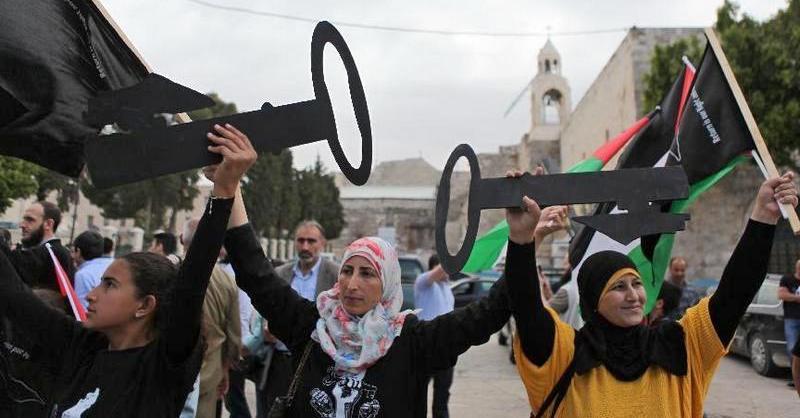
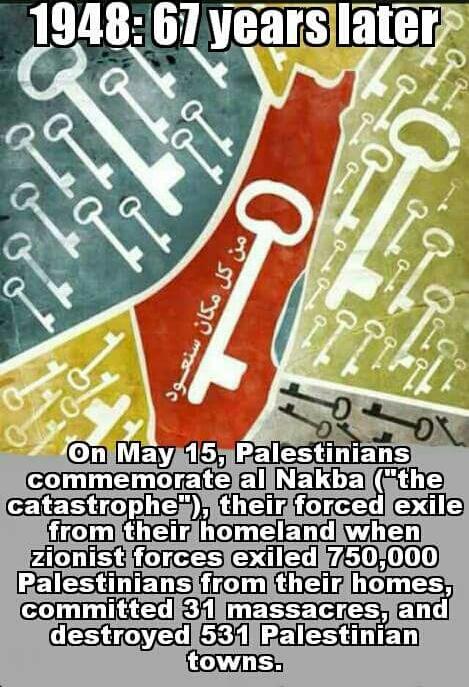 Israel's treatment of
non-Jewish Palestinians throughout
Israel and the oPt
constitutes an overall discriminatory regime with the primary purpose
of
controlling the maximum amount of land with the minimum amount of
indigenous Palestinians residing upon it. The main components of this
structure
serve to violate Palestinian rights in areas such as nationality,
citizenship,
residency, and land ownership.
Israel's treatment of
non-Jewish Palestinians throughout
Israel and the oPt
constitutes an overall discriminatory regime with the primary purpose
of
controlling the maximum amount of land with the minimum amount of
indigenous Palestinians residing upon it. The main components of this
structure
serve to violate Palestinian rights in areas such as nationality,
citizenship,
residency, and land ownership.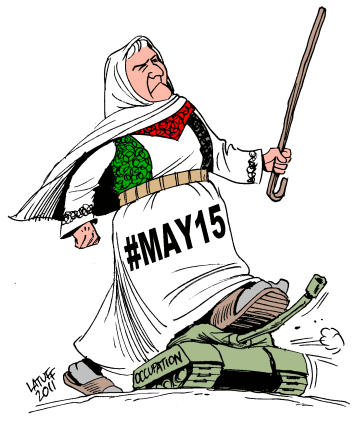 The motivation underpinning
this policy is revealed
through consideration
of statements made by Israeli officials. In May 2002 -- just months
before the
new law was unveiled -- the then-Minister of Interior, Eli Yishai,
declared that
between 1993 and 2002, roughly 140,000 Palestinians had moved to Israel
or
East Jerusalem by way of family unification permits. Yishai went on to
stress
the need for legislation which would "help to halt the phenomenon and
maintain Israel's nature as a Jewish and democratic state in the long
run."
The motivation underpinning
this policy is revealed
through consideration
of statements made by Israeli officials. In May 2002 -- just months
before the
new law was unveiled -- the then-Minister of Interior, Eli Yishai,
declared that
between 1993 and 2002, roughly 140,000 Palestinians had moved to Israel
or
East Jerusalem by way of family unification permits. Yishai went on to
stress
the need for legislation which would "help to halt the phenomenon and
maintain Israel's nature as a Jewish and democratic state in the long
run."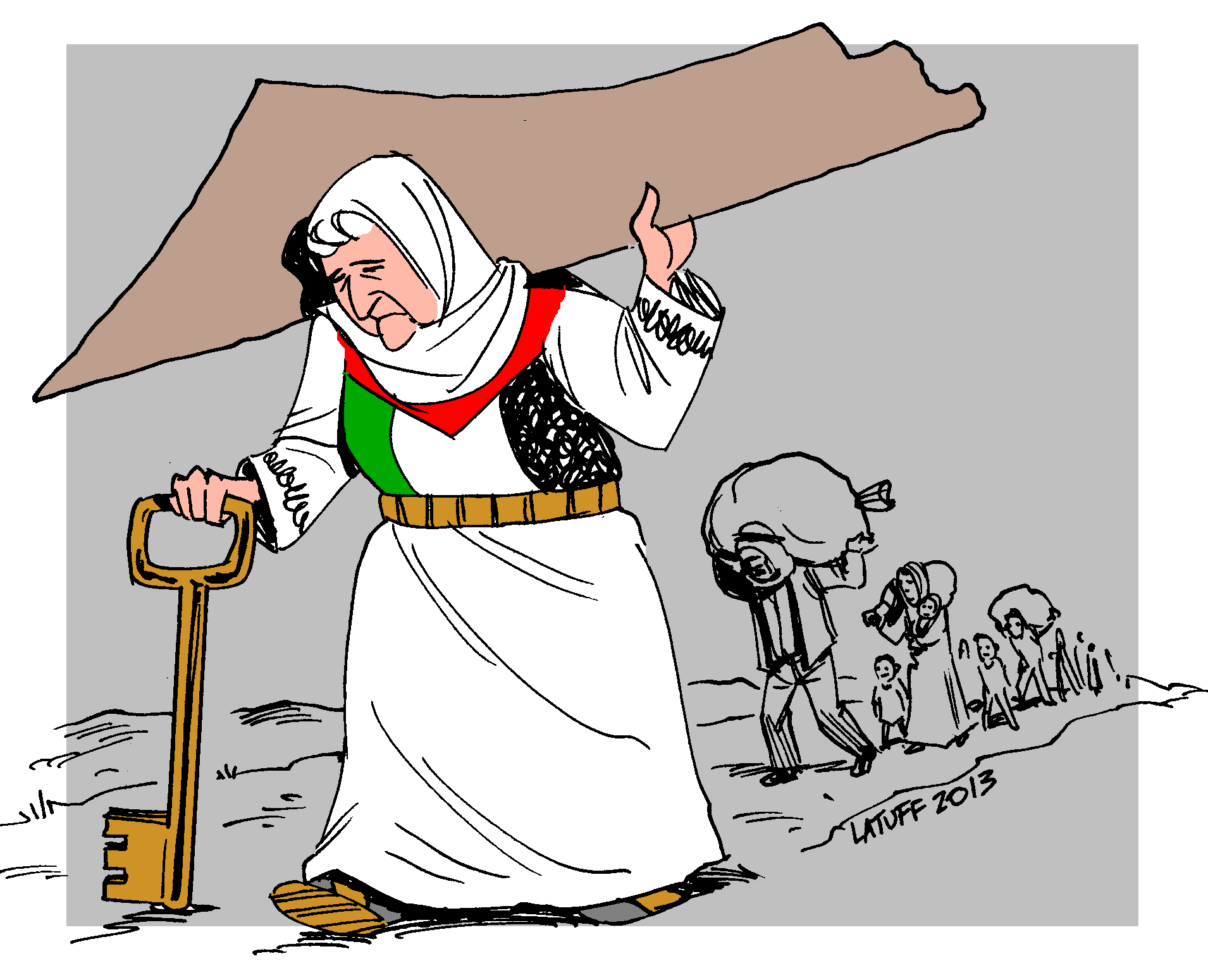 A rights-based approach
could be best described as
normatively based on
international rights standards and operationally directed to promoting
and
protecting those rights. Therefore, a rights-based approach should
integrate
norms, standards and principles of the international rights system into
the
plans, policies and processes which seek solutions to the specific
conflict at
hand in order to ensure human dignity and justice. Simply speaking,
peace
cannot be recognized when fundamental human rights and freedoms are
violated. In the case of Palestine, this approach would entail
solutions based
on international law rather than a reliance on political negotiations
to bring
about a long lasting and just solution.
A rights-based approach
could be best described as
normatively based on
international rights standards and operationally directed to promoting
and
protecting those rights. Therefore, a rights-based approach should
integrate
norms, standards and principles of the international rights system into
the
plans, policies and processes which seek solutions to the specific
conflict at
hand in order to ensure human dignity and justice. Simply speaking,
peace
cannot be recognized when fundamental human rights and freedoms are
violated. In the case of Palestine, this approach would entail
solutions based
on international law rather than a reliance on political negotiations
to bring
about a long lasting and just solution.
